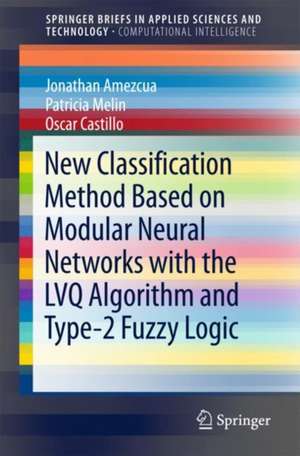New Classification Method Based on Modular Neural Networks with the LVQ Algorithm and Type-2 Fuzzy Logic: SpringerBriefs in Applied Sciences and Technology
Autor Jonathan Amezcua, Patricia Melin, Oscar Castilloen Limba Engleză Paperback – 15 feb 2018
Din seria SpringerBriefs in Applied Sciences and Technology
-
 Preț: 380.29 lei
Preț: 380.29 lei - 17%
 Preț: 360.34 lei
Preț: 360.34 lei - 20%
 Preț: 386.12 lei
Preț: 386.12 lei -
 Preț: 380.07 lei
Preț: 380.07 lei -
 Preț: 377.95 lei
Preț: 377.95 lei -
 Preț: 382.32 lei
Preț: 382.32 lei -
 Preț: 376.59 lei
Preț: 376.59 lei -
 Preț: 379.09 lei
Preț: 379.09 lei -
 Preț: 378.12 lei
Preț: 378.12 lei - 20%
 Preț: 293.83 lei
Preț: 293.83 lei -
 Preț: 344.90 lei
Preț: 344.90 lei -
 Preț: 321.36 lei
Preț: 321.36 lei -
 Preț: 264.79 lei
Preț: 264.79 lei -
 Preț: 344.90 lei
Preț: 344.90 lei -
 Preț: 356.46 lei
Preț: 356.46 lei -
 Preț: 382.95 lei
Preț: 382.95 lei -
 Preț: 355.66 lei
Preț: 355.66 lei -
 Preț: 479.67 lei
Preț: 479.67 lei -
 Preț: 415.18 lei
Preț: 415.18 lei -
 Preț: 444.52 lei
Preț: 444.52 lei - 20%
 Preț: 301.86 lei
Preț: 301.86 lei -
 Preț: 409.43 lei
Preț: 409.43 lei - 20%
 Preț: 322.17 lei
Preț: 322.17 lei -
 Preț: 355.49 lei
Preț: 355.49 lei - 15%
 Preț: 462.51 lei
Preț: 462.51 lei -
 Preț: 377.18 lei
Preț: 377.18 lei -
 Preț: 355.93 lei
Preț: 355.93 lei -
 Preț: 382.95 lei
Preț: 382.95 lei -
 Preț: 378.12 lei
Preț: 378.12 lei -
 Preț: 378.12 lei
Preț: 378.12 lei -
 Preț: 380.07 lei
Preț: 380.07 lei -
 Preț: 380.07 lei
Preț: 380.07 lei - 20%
 Preț: 326.28 lei
Preț: 326.28 lei -
 Preț: 312.68 lei
Preț: 312.68 lei -
 Preț: 356.43 lei
Preț: 356.43 lei -
 Preț: 412.30 lei
Preț: 412.30 lei - 20%
 Preț: 225.31 lei
Preț: 225.31 lei -
 Preț: 378.12 lei
Preț: 378.12 lei -
 Preț: 376.59 lei
Preț: 376.59 lei -
 Preț: 195.87 lei
Preț: 195.87 lei -
 Preț: 376.22 lei
Preț: 376.22 lei - 20%
 Preț: 324.64 lei
Preț: 324.64 lei - 20%
 Preț: 288.73 lei
Preț: 288.73 lei -
 Preț: 377.57 lei
Preț: 377.57 lei -
 Preț: 261.91 lei
Preț: 261.91 lei -
 Preț: 381.98 lei
Preț: 381.98 lei -
 Preț: 273.64 lei
Preț: 273.64 lei -
 Preț: 410.87 lei
Preț: 410.87 lei -
 Preț: 379.68 lei
Preț: 379.68 lei -
 Preț: 374.30 lei
Preț: 374.30 lei
Preț: 322.02 lei
Preț vechi: 402.53 lei
-20% Nou
Puncte Express: 483
Preț estimativ în valută:
61.63€ • 64.10$ • 50.88£
61.63€ • 64.10$ • 50.88£
Carte tipărită la comandă
Livrare economică 12-26 aprilie
Preluare comenzi: 021 569.72.76
Specificații
ISBN-13: 9783319737720
ISBN-10: 3319737724
Pagini: 78
Ilustrații: VIII, 73 p. 22 illus., 12 illus. in color.
Dimensiuni: 155 x 235 mm
Greutate: 0.13 kg
Ediția:1st ed. 2018
Editura: Springer International Publishing
Colecția Springer
Seriile SpringerBriefs in Applied Sciences and Technology, SpringerBriefs in Computational Intelligence
Locul publicării:Cham, Switzerland
ISBN-10: 3319737724
Pagini: 78
Ilustrații: VIII, 73 p. 22 illus., 12 illus. in color.
Dimensiuni: 155 x 235 mm
Greutate: 0.13 kg
Ediția:1st ed. 2018
Editura: Springer International Publishing
Colecția Springer
Seriile SpringerBriefs in Applied Sciences and Technology, SpringerBriefs in Computational Intelligence
Locul publicării:Cham, Switzerland
Cuprins
Introduction.- Theory and Background.- Problem Statement.- Proposed Classification Method.- Simulation Results.- Conclusions.
Textul de pe ultima copertă
In this book a new model for data classification was developed. This new model is based on the competitive neural network Learning Vector Quantization (LVQ) and type-2 fuzzy logic. This computational model consists of the hybridization of the aforementioned techniques, using a fuzzy logic system within the competitive layer of the LVQ network to determine the shortest distance between a centroid and an input vector. This new model is based on a modular LVQ architecture to further improve its performance on complex classification problems. It also implements a data-similarity process for preprocessing the datasets, in order to build dynamic architectures, having the classes with the highest degree of similarity in different modules. Some architectures were developed in order to work mainly with two datasets, an arrhythmia dataset (using ECG signals) for classifying 15 different types of arrhythmias, and a satellite images segments dataset used for classifying six different types ofsoil. Both datasets show interesting features that makes them interesting for testing new classification methods.
Caracteristici
Develops a new model for data classification Presents a data classification model that is based on the competitive Neural Network Learning Vector Quantization (LVQ) and type-2 fuzzy logic
